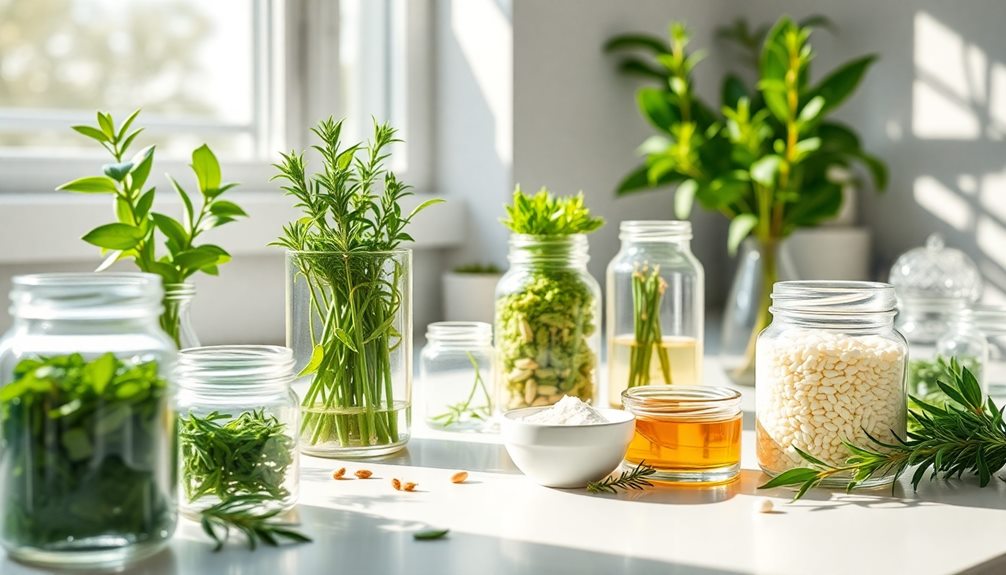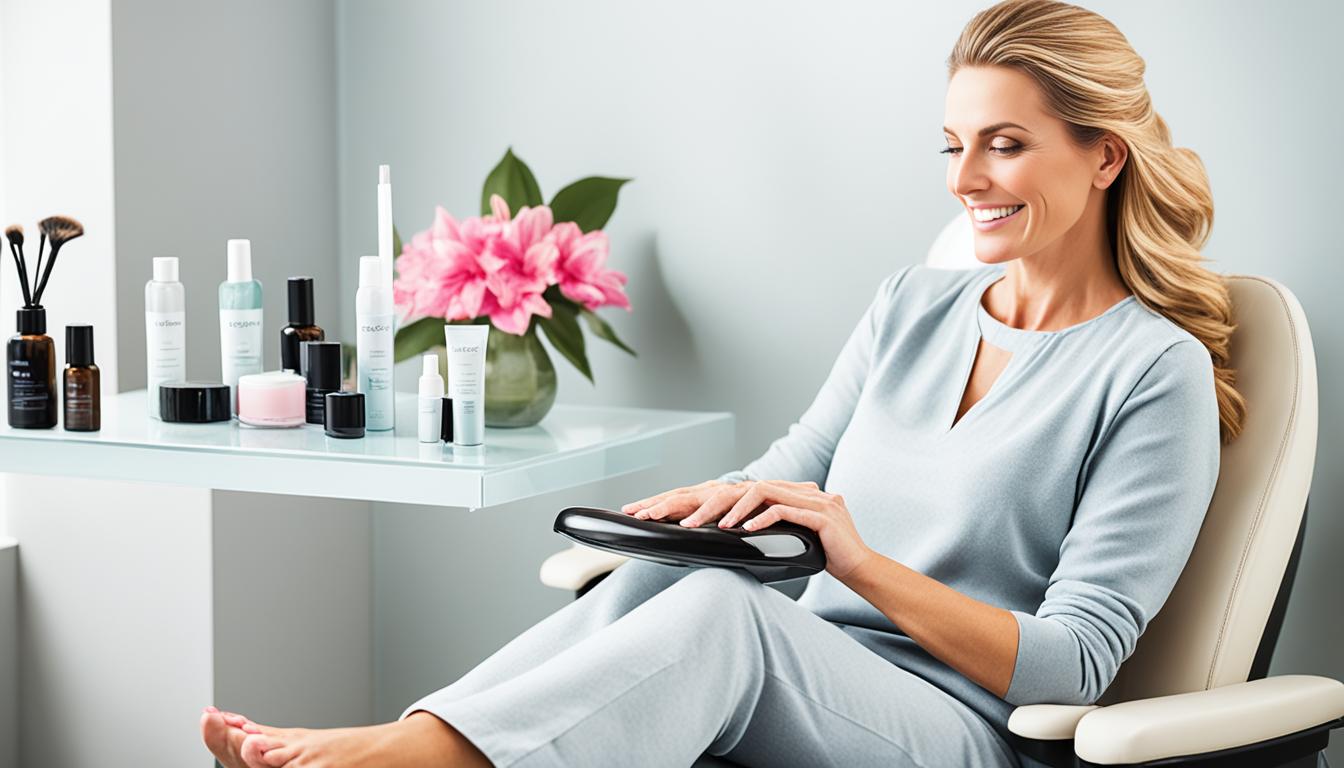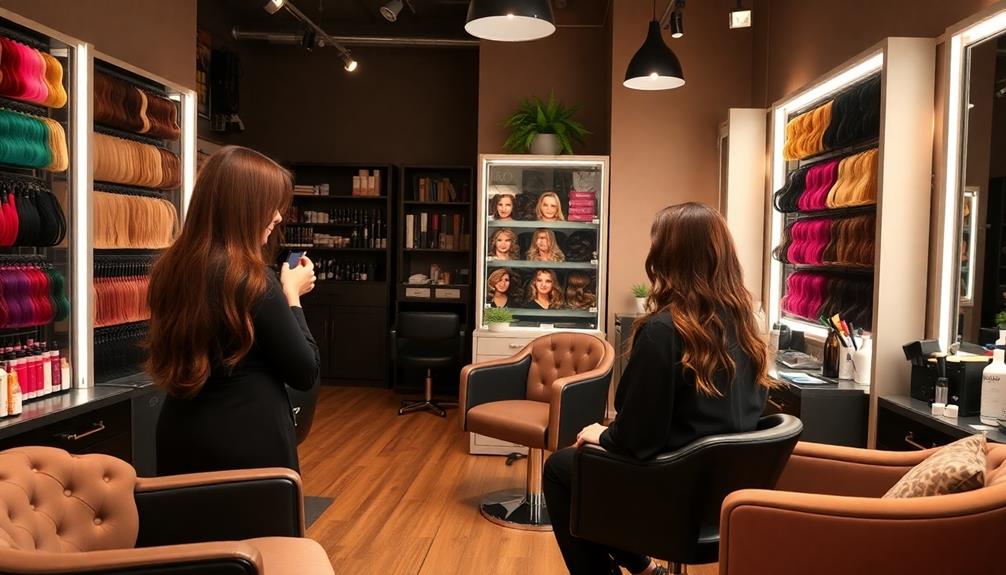Natural preservatives are revolutionizing the clean beauty scene, making your skincare safer and more effective. With over 65% of consumers opting for clean ingredients, these natural alternatives, like benzyl alcohol and salicylic acid, replace harmful synthetic options such as parabens. They protect your products from microbial contamination while aligning with your health-conscious values. As awareness rises about the risks of synthetic preservatives, brands are increasingly adopting these natural solutions. This shift not only improves product safety but also supports sustainability in the industry. Discover how these innovative practices shape the future of skincare and your beauty choices.
Key Takeaways
- Clean beauty prioritizes safe, non-toxic ingredients, with over 65% of consumers seeking products free from harmful preservatives like parabens.
- The demand for natural preservatives, such as benzyl alcohol and salicylic acid, is rising due to growing health concerns about synthetic options.
- Regulatory scrutiny is increasing on synthetic preservatives, prompting a greater emphasis on transparency and natural alternatives in the beauty industry.
- Innovations in green chemistry and biotechnology are leading to sustainable, effective natural preservatives that align with consumer expectations for safety and efficacy.
- The future of natural preservation includes plant extracts and fermentation-based ingredients, with a focus on multifunctional preservatives and regulatory compliance.
Overview of Clean Beauty
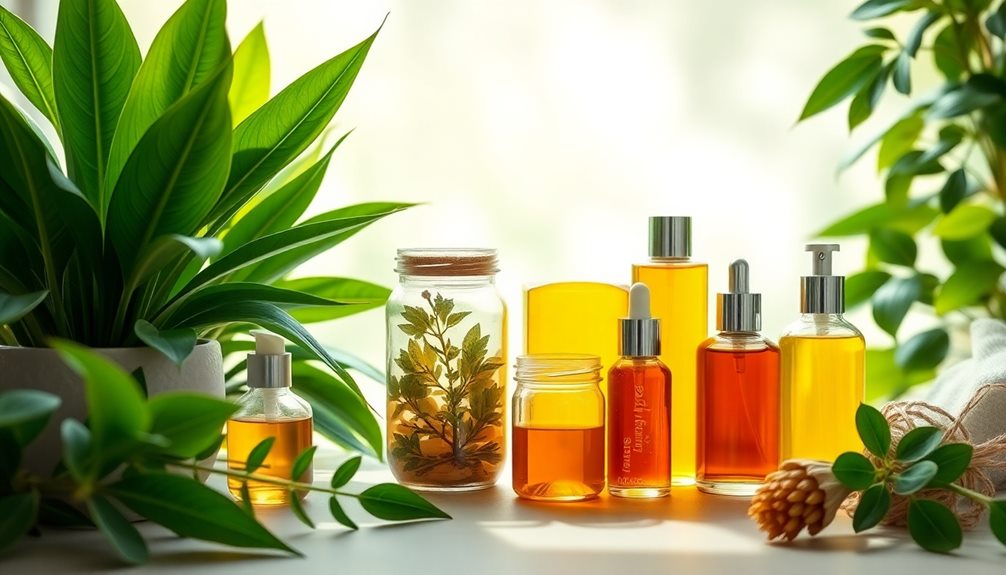
Clean beauty has emerged as a powerful movement within the cosmetics industry, prioritizing safe, non-toxic ingredients that resonate with health-conscious consumers. You're not alone in wanting products that focus on clean ingredients; over 65% of consumers now prioritize these when choosing beauty items.
This demand has fueled an impressive 18% growth in the clean beauty market, far surpassing the overall beauty industry's growth of just 4.3%. As consumers become more educated about financial implications of choices, they're increasingly opting for products that not only benefit their health but also their wallets in the long run.
Shifting trends show that paraben-free products account for over 60% of beauty sales and grow steadily at 5.3%, reflecting a clear preference for healthier alternatives.
Consumers like you're increasingly becoming savvy shoppers, demanding transparency in ingredient labeling and scrutinizing product claims. This push for clarity has led to initiatives such as Ulta's Conscious Beauty and Sephora's Clean at Sephora, which help you navigate the world of organic personal care.
As a result, you can now expect clearer labeling and a focus on sustainable practices, including biodegradable packaging and fair trade sourcing.
The clean beauty movement isn't just a trend; it's reshaping the industry by putting your health and the environment at the forefront.
Importance of Natural Preservatives
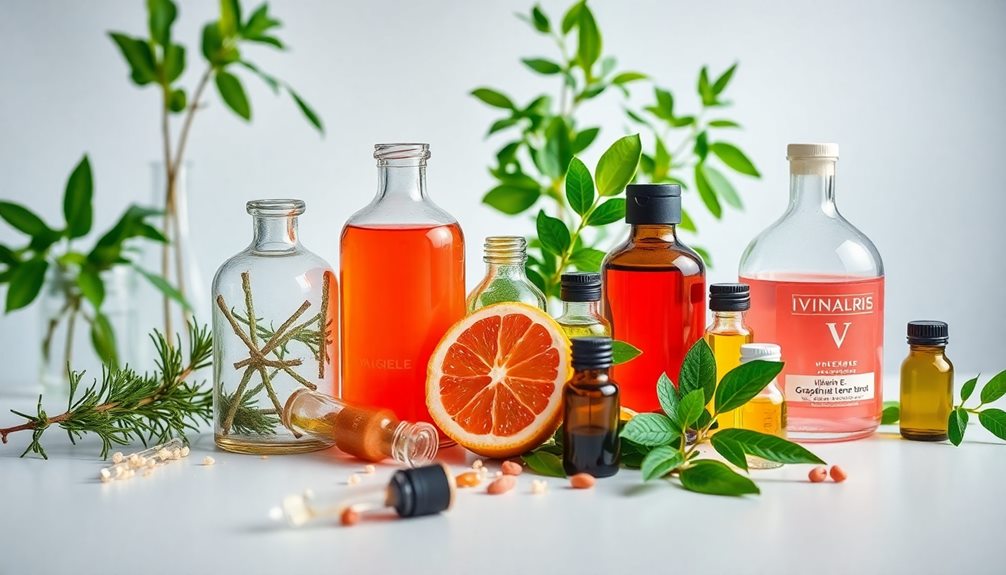
As consumers increasingly prioritize health-conscious choices in beauty products, the role of natural preservatives becomes more significant.
In addition to skincare, the importance of safe product formulations is also highlighted in areas like newborn feeding options, where ingredient safety is essential.
Natural preservatives are important for protecting water-based formulations from microbial contamination, ensuring the safety and integrity of the cosmetic product you use. Without adequate preservation, the risk of spoilage grows, leading to potential health hazards from pathogenic contaminants.
In the world of cosmetics, water-based formulations specifically require effective preservatives to prevent microbial growth, while anhydrous products typically don't unless they come into contact with water. This makes understanding the importance of preservatives in cosmetics essential for your health.
Key natural preservatives, such as benzyl alcohol, salicylic acid, glycerin, and sorbic acid, effectively combat a variety of microorganisms and often comply with international safety standards.
Moreover, regulatory compliance and transparency in ingredient sourcing are becoming increasingly critical.
Natural preservatives must align with the formulation type, pH range, and ingredient compatibility for maximum effectiveness.
Consumer Trends and Demands
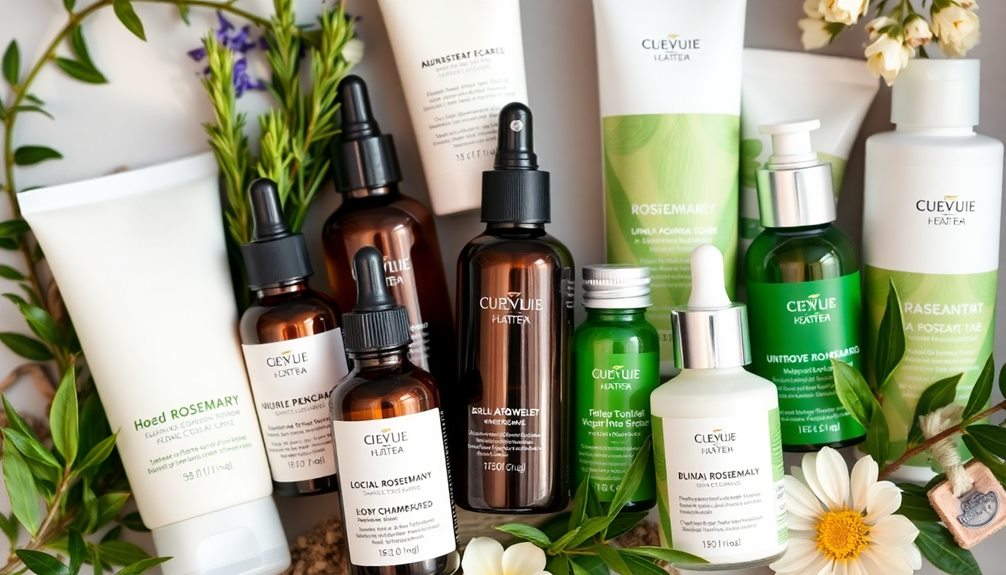
You're not alone if you're prioritizing transparency and ingredient safety in your beauty products. As more consumers demand clear labeling and natural components, brands must adapt to meet these expectations.
This shift not only reflects your values but also drives the clean beauty movement forward. Additionally, understanding financial metrics can empower brands to make informed decisions about product development and marketing strategies that resonate with eco-conscious consumers.
As the demand for clean beauty rises, businesses must also embrace a growth mindset to innovate and thrive in this competitive landscape.
Demand for Transparency
In today's beauty landscape, transparency in ingredient sourcing and formulation has become a top priority for consumers. Over 65% of you prioritize clean ingredients, showcasing a strong demand for clarity in formulations. You're increasingly drawn to recognizable natural ingredients like pineapple and algae, which further emphasizes this trend.
This desire for transparency in ingredient labeling fosters trust between you and brands. With 51% of consumers wanting brands to reduce plastic packaging, many of you are actively trying products that embody this commitment to sustainability. The clean beauty sector has surged by 18%, markedly outpacing the overall beauty growth of 4.3%.
As greenwashing faces heightened scrutiny, you expect brands to demonstrate genuine commitment. Here's a quick glance at your preferences:
| Demand for Transparency | Consumer Preferences | Natural Ingredients |
|---|---|---|
| 65% prioritize clean ingredients | 51% want less plastic | Pineapple, Algae |
| 18% growth in clean beauty | 33% tried reduced plastic | Natural preservatives |
| Expect genuine sustainability | Brand trust matters | Ethical sourcing |
Your choices are shaping the future of beauty, driving brands to adopt cleaner, more transparent practices.
Focus on Ingredient Safety
Consumers are increasingly prioritizing ingredient safety, driving a significant shift in the beauty industry. Over 65% of you're now choosing clean products based on their ingredient transparency, reflecting a strong demand for safer skincare formulations.
This focus on safety has contributed to the rise of paraben-free products, which account for over 60% of beauty sales and are growing at a rate of 5.3%.
You're also seeking familiar ingredients, often those found in grocery aisles, showcasing a preference for recognizable and safe components in your natural skincare routine.
As awareness of harmful preservatives like parabens and phenoxyethanol rises, you're becoming more informed about potential health risks associated with these substances.
The clean beauty movement emphasizes the importance of effective natural preservatives, ensuring product safety without compromising your desire for non-toxic and environmentally friendly formulations.
By choosing products that prioritize ingredient safety, you're not just protecting your skin; you're also supporting a growing trend that values health and sustainability.
As consumers, your demands are reshaping the beauty landscape, pushing brands to innovate and offer cleaner, safer alternatives.
Challenges With Synthetic Preservatives
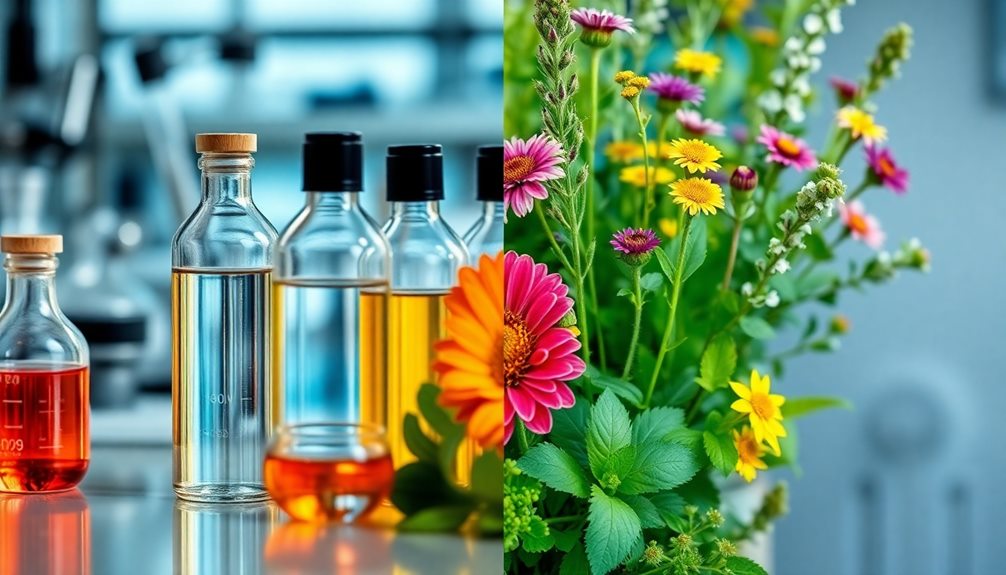
As you explore the beauty industry, you'll notice increasing concerns around synthetic preservatives like parabens and phenoxyethanol.
With health risks linked to these ingredients and growing regulatory scrutiny, many consumers are demanding safer alternatives.
This shift in awareness is pushing brands to rethink their formulations and prioritize clean ingredients.
Health Risks of Synthetic Preservatives
Synthetic preservatives pose significant health risks that have sparked growing concerns among consumers and health experts alike. Many synthetic preservatives, like parabens, are linked to endocrine disruption and might mimic estrogen, raising alarms about their potential role in breast cancer tumors. Other preservatives, such as BHT, have been associated with liver and kidney damage at high doses. Additionally, phenoxyethanol can trigger allergic reactions and may pose nervous system risks, especially in infants.
As awareness of these health hazards rises, over 65% of you prioritize clean, non-toxic ingredients in your beauty products. This shift is prompting brands to explore natural alternatives that maintain product safety without compromising health.
| Synthetic Preservative | Health Risks | Natural Alternatives |
|---|---|---|
| Parabens | Endocrine disruption, cancer link | Plant extracts |
| BHT | Possible liver/kidney damage | Rosemary extract |
| Phenoxyethanol | Allergic reactions, nervous risks | Vitamin E |
Incorporating clean ingredients into your skincare routine not only benefits your health but also aligns with the growing clean beauty movement. It's crucial to stay informed and choose wisely.
Regulatory Scrutiny and Concerns
Concerns about the safety of synthetic preservatives have led to increased regulatory scrutiny, especially regarding ingredients like parabens. These preservatives are effective in preventing microbial growth, but they've also been linked to health issues such as breast cancer and endocrine disruption. Since parabens mimic estrogen, many consumers worry about their long-term safety in skincare products.
Moreover, other synthetic preservatives like BHT and formaldehyde-releasing agents are facing criticism for potential allergic reactions and neurotoxicity, particularly in sensitive populations. As awareness of these risks grows, regulatory bodies are advocating for clearer labeling and greater transparency about synthetic preservatives in cosmetics.
This shift in consumer demand for safer alternatives has driven the beauty industry to innovate and reformulate products using natural preservatives. Brands are now actively seeking out plant-based or natural options that offer efficacy without the health concerns associated with synthetic ingredients.
The push for clean beauty is prompting a significant transformation within the industry, encouraging companies to prioritize safety and health in their formulations. As a result, you now have more choices for skincare products that align with your values and well-being.
Consumer Awareness and Demand
In today's beauty landscape, consumer awareness about ingredient safety is at an all-time high. You're not alone in prioritizing clean ingredients, with over 65% of consumers actively seeking products free from harmful ingredients. This shift has spurred increased scrutiny of synthetic preservatives like parabens, which research links to endocrine disruption and breast cancer tumors.
It's no wonder you're concerned about what's in your skincare.
Synthetic preservatives such as BHT and phenoxyethanol have also raised alarms, particularly for vulnerable populations like infants, where allergic reactions and potential nervous system effects are a risk. As awareness of these dangers grows, so does the demand for natural preservatives. You're looking for safer alternatives that guarantee your beauty products remain effective without compromising your health.
Transparency in ingredient labeling plays an essential role in building your trust. As you become more informed about harmful synthetic preservatives, it's clear that clean beauty practices emphasizing ingredient safety are here to stay.
The beauty industry must adapt to meet your needs for natural preservation methods, assuring that you can feel confident in the products you choose.
Effective Natural Preservation Methods
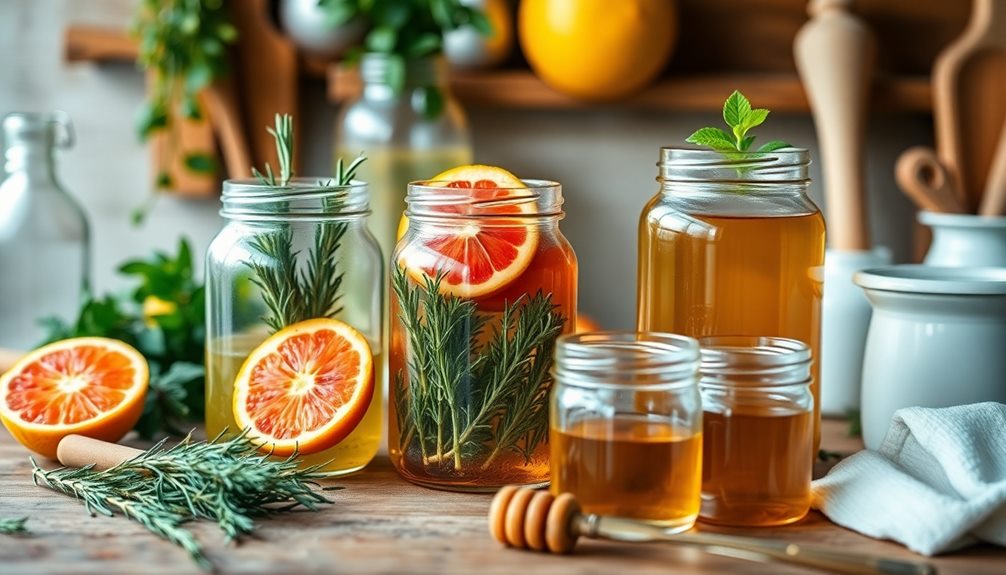
Natural preservatives play an indispensable role in maintaining the integrity and safety of water-based cosmetics by protecting them from microbial contamination.
In the domain of clean beauty, skincare formulators are increasingly turning to effective natural preservation methods to guarantee product longevity. Options like benzyl alcohol, salicylic acid, and glycerin are essential, each offering unique antimicrobial activity suited for various formulations. Moreover, with the growing demand for clean beauty products, consumers are seeking skincare solutions that not only preserve the integrity of the formulas but also offer additional benefits such as antiaging properties. This has led to an increased focus on antiaging ingredients research findings to inform the development of natural preservation methods that also contribute to the overall efficacy of the product. As a result, skincare formulators are exploring innovative approaches to preservation that align with the clean beauty movement and meet the demand for multifunctional skincare solutions.
For instance, probiotic-based preservatives such as Leucidal SF MAX work well in a pH range of 3-8, allowing for versatility in product development. This adaptability is vital as it enables formulators to create effective, safe products that align with consumer demand for clean ingredients.
Additionally, advancements in packaging, like biophotonic glass, can enhance product stability by blocking harmful light and further supporting the effectiveness of natural preservatives.
The ongoing research into plant-based and multifunctional ingredients is driving innovations in this field, guaranteeing that natural preservatives not only protect but also deliver additional benefits.
Key Natural Preservatives in Use
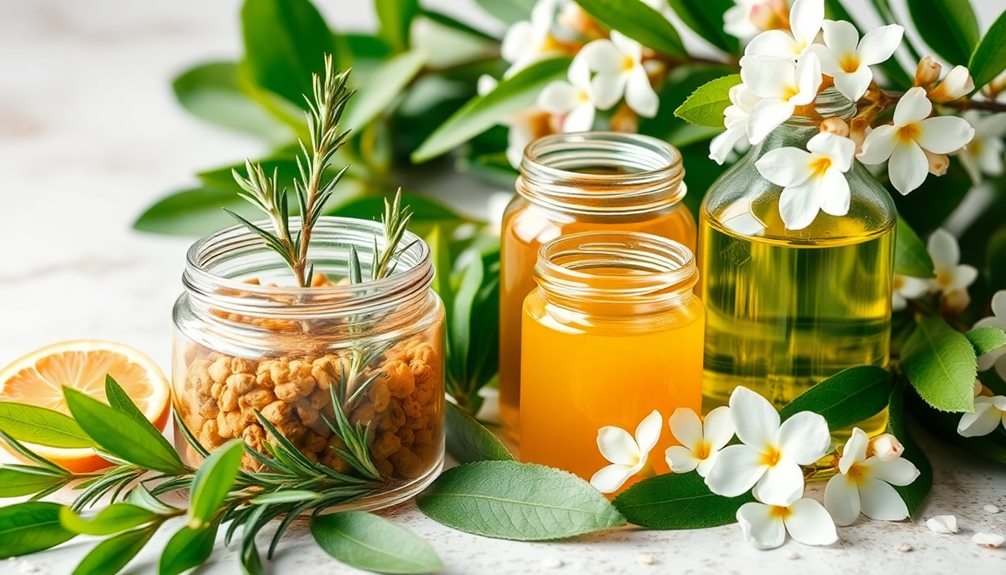
As the demand for clean beauty products rises, formulators are increasingly relying on key natural preservatives to guarantee product safety and efficacy.
These natural preservatives play an essential role in maintaining the integrity of cosmetic formulations, ensuring they remain effective while aligning with clean beauty principles.
Here are some key players in the field:
- Benzyl Alcohol: Effective against a variety of microbes, it serves as a versatile preservative.
- Salicylic Acid: Known for its antimicrobial properties, it's commonly used in acne treatments.
- Glycerin: Apart from its moisturizing benefits, it helps in stabilizing formulations.
- Sorbic Acid: A natural antifungal agent, it protects against spoilage in products.
- Leucidal SF MAX: A probiotic-based preservative that works within a pH range of 3-8.
These natural preservatives contribute greatly to preservative systems, enhancing the safety and shelf life of products.
Innovations in Sustainable Ingredients
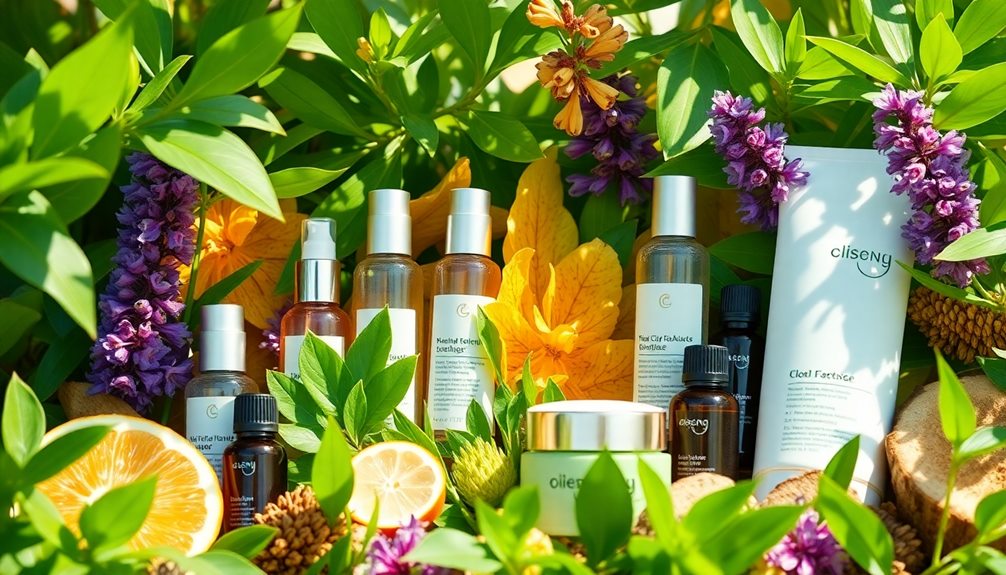
The clean beauty movement is driving remarkable innovations in sustainable ingredients that prioritize both efficacy and environmental responsibility. As you explore natural products, you'll notice a significant shift towards ingredients that not only enhance performance but also align with eco-friendly values.
The natural ingredients market is projected to grow from USD $642 million in 2022 to USD $1,095 million by 2030, reflecting your preference for sustainable choices.
Innovations in green chemistry and biotechnology are at the forefront of this transformation, yielding effective alternatives to synthetic components. Multifunctional ingredients, like natural preservatives derived from plant extracts and essential oils, are particularly significant. They not only preserve product integrity but also guarantee safety without sacrificing clean beauty principles.
Companies like BASF and Evonik Industries are leading these innovations, introducing groundbreaking formulations such as Verdessence RiceTouch and biosurfactants on an industrial scale.
The rise of natural preservatives, including benzyl alcohol and glyceryl caprylate, plays a vital role in extending shelf life while maintaining a commitment to clean beauty. As you choose your skincare products, you'll find that these sustainable innovations are reshaping the beauty landscape for the better.
Market Leaders in Clean Beauty
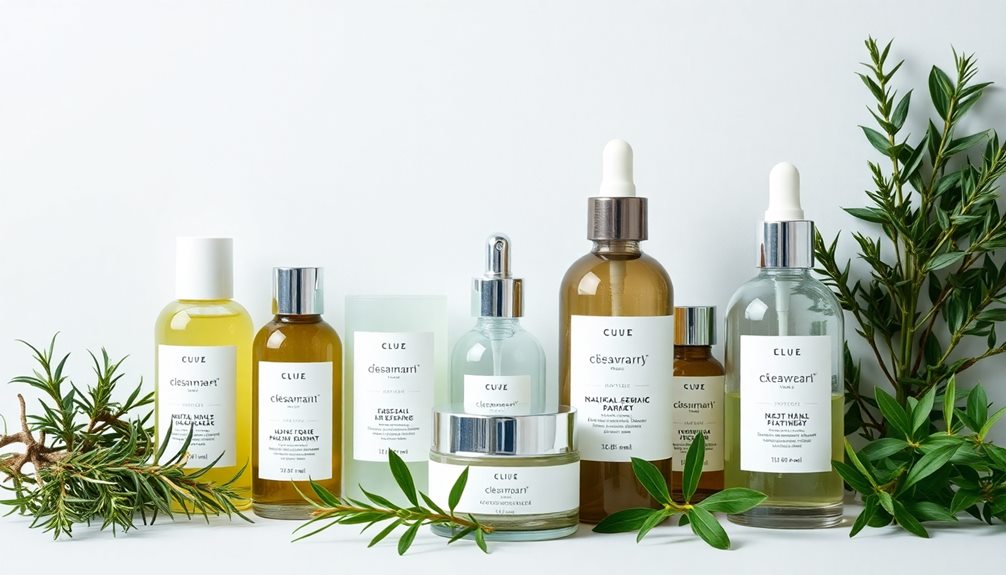
As you explore the world of clean beauty, you'll notice how industry leaders like L'Oréal and BASF are stepping up their game with innovative, sustainable practices.
These companies aren't just responding to consumer demand; they're actively shaping the future of beauty with natural ingredients and eco-friendly formulations.
Industry Leaders' Innovations
Clean beauty is rapidly evolving, and industry leaders are at the forefront of this transformation with groundbreaking innovations. Companies like L'Oréal and Garnier are making significant strides with initiatives such as Garnier's Green Beauty Initiative, which aims for 100% renewable energy and zero plastic pollution by 2025.
This commitment to sustainable packaging and environmentally-friendly practices is reshaping the cosmetics landscape.
Here's how these innovations are pushing the boundaries of clean beauty:
- BASF's Verdessence RiceTouch uses non-GMO rice, showing sustainable ingredient sourcing.
- Evonik Industries AG has launched the first industrial-scale rhamnolipid biosurfactant, advancing natural surfactants in skincare.
- Solvay's Naternal brand emphasizes bio-based biodegradable polymers for eco-friendly formulations.
- Ashland Global Holdings' The Natural Line integrates hyalurotech sodium hyaluronate, featuring effective natural ingredients.
- Garnier's initiative focuses on eliminating plastic pollution, aligning with ingredient trends toward sustainability.
These advancements not only enhance the efficacy of natural and organic products but also redefine the role of preservatives in skincare, ensuring that beauty can be both effective and environmentally responsible.
Sustainable Practices Adoption
Amid growing consumer awareness, market leaders in clean beauty are adopting sustainable practices that reshape the industry. Companies like L'Oréal and BASF are leading the charge, focusing on significant reductions in greenhouse gas emissions and innovative eco-friendly ingredients. Garnier's Green Beauty Initiative aims for 100% renewable energy and zero plastic pollution by 2025, highlighting their commitment to sustainable practices in product development and packaging.
Here's a quick look at some remarkable efforts:
| Company | Initiative | Focus Area |
|---|---|---|
| L'Oréal | Sustainability targets | Greenhouse gas reduction |
| BASF | Verdessence RiceTouch | Biodegradable ingredients |
| Garnier | Green Beauty Initiative | Renewable energy, zero waste |
| Market | Collaborative green chemistry efforts | Eco-design in supply chain |
The natural ingredients market in cosmetics is projected to grow from USD $642M in 2022 to USD $1,095M by 2030, driven by consumer demand for clean and sustainable organic skincare products. By integrating a robust preservative system and focusing on sustainable practices, these industry leaders are paving the way for a cleaner, greener future in beauty.
Future Directions for Natural Preservatives
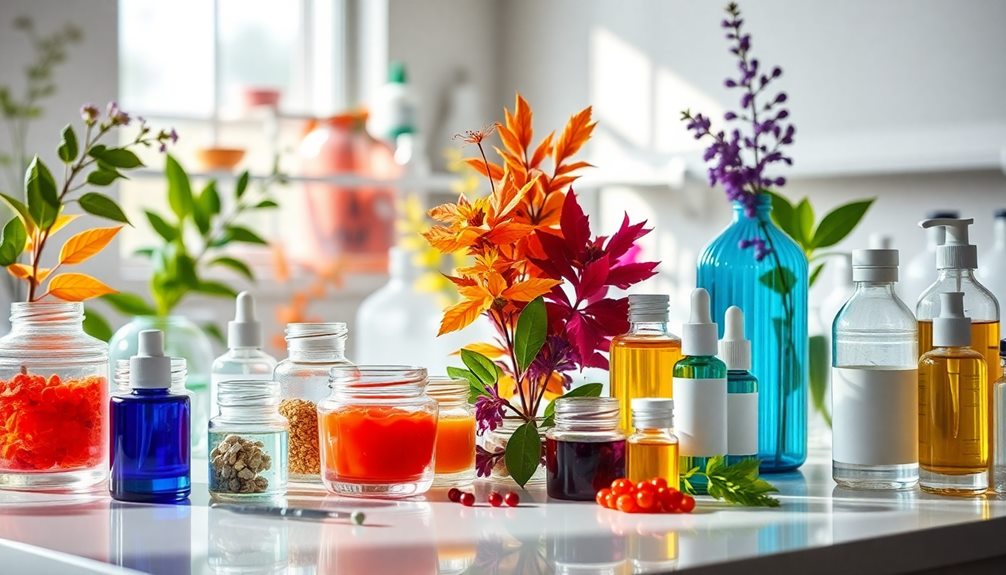
There's a growing shift towards natural preservatives in the skincare industry, responding to consumer demand for clean beauty products.
With over 65% of consumers prioritizing safe, non-toxic ingredients, brands are innovating to meet these expectations. The future of natural preservatives looks promising, emphasizing sustainability and efficacy.
As you explore this evolving landscape, consider the following key trends:
- Increased use of plant extracts and fermentation-based ingredients for preservation.
- Development of multi-functional preservatives that provide additional benefits, such as hydration or anti-aging effects.
- Heightened focus on regulatory compliance, with certifications like ECOCERT and COSMOS gaining importance.
- Ongoing research into new preservation technologies, including probiotic-based solutions that align with eco-friendly practices.
- Demand for transparency in ingredient labeling, pushing brands to showcase scientifically-backed claims about safety and effectiveness.
Best Practices for Product Preservation
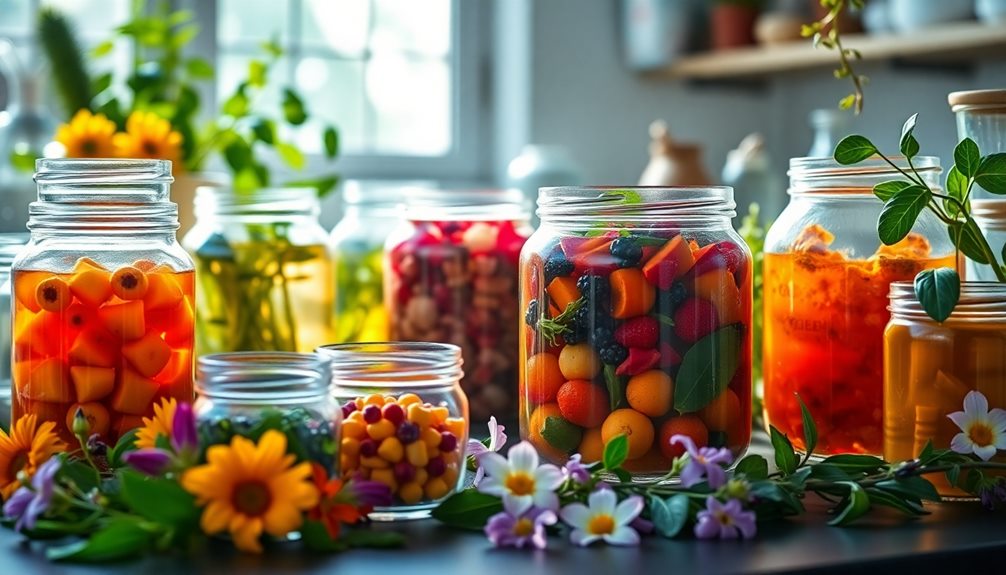
Effective product preservation is vital for maintaining the safety and longevity of water-based skincare formulations. To prevent microbial contamination, you should always prioritize proper preservation methods for your products.
Using spatulas for jarred items can greatly minimize the risk of contamination, ensuring that your skincare retains its integrity.
Adhering to expiration guidelines is another best practice; it helps you maintain your products' safety and efficacy. When opting for natural preservatives like benzyl alcohol or glycerin, make sure they align with your formulation's working pH. Many effective preservatives operate best below pH 5.5, so adjusting your formula accordingly is essential.
Before launching any product, don't skip testing the efficacy of your preservatives. This step not only prevents potential recalls but also builds consumer trust in your brand.
Frequently Asked Questions
What Is the Best Natural Preservative for Skincare?
When choosing the best natural preservative for skincare, consider options like benzyl alcohol for its antimicrobial properties or Leucidal SF MAX for its probiotic benefits. Testing formulations guarantees compatibility and effectiveness, keeping your products safe and reliable.
Is Clean Beauty Non-Toxic?
Yes, clean beauty's non-toxic. You'll find that many brands prioritize safe, natural ingredients, avoiding harmful chemicals. By choosing clean products, you're actively promoting healthier options for your skin and supporting a safer beauty industry.
Which Preservative Is Safe for Skin?
Oh sure, let's just slather on anything! But really, you'll want to stick with natural preservatives like benzyl alcohol or salicylic acid. They're safe for your skin, effective, and won't turn your face into a science experiment!
Is Optiphen a Natural Preservative in Cosmetics?
No, Optiphen isn't a natural preservative in cosmetics. It contains synthetic components like phenoxyethanol. While effective, many consumers prefer truly natural alternatives, driving a shift towards plant-derived and fermentation-based preservation methods in skincare.
Conclusion
As you explore the clean beauty landscape, it's clear that natural preservatives are gaining traction, driven by consumer demand for safer, eco-friendly products. Did you know that 62% of consumers prefer products with natural ingredients over synthetic ones? This shift not only highlights your desire for transparency and sustainability but also encourages brands to innovate. By embracing effective natural preservation methods, you're helping to shape a future where beauty is both clean and effective.
